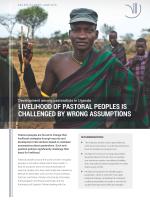Development initiatives challenge livelihoods of pastoralists
Pastoral peoples around the world are often marginal peoples in the nation-states which they inhabit. Policies dealing with the pastoral peoples are often guided by mistaken assumptions about pastoralism and pastoralists, which lead to interventions ill-fitting to the realities on the ground: The assumption that pastoralism is often associated with violence, and the assumption that pastoralists are inherently conservative.
Interventions end up working against the livelihood strategies of the people, leaving them with poorer options for survival, this policy brief by Marianne Mosebo finds.
Predominant explanations of violence in pastoral areas are competition for limited water and grazing resources, which ignores the fact that pastoralism historically has been adopted exactly to manage resource scarcity in semi-arid and arid environments. State interventions in pastoral regions have been dominated by military solutions focused on ‘pacifying’ the pastoralists rather than support the alliance-building and peace mechanism in the pastoral societies.
Development projects rarely support the pastoral livelihood but focus on alternative livelihoods, such as education and agriculture despite the fact that pastoralism often is the most viable livelihood for them even to this day. The lack of success for anti-pastoral development programmes are often blamed on an assumed pastoral conservatism.
The assumptions about pastoralism must be changed rather than the pastoralists’ knowledge and ways of surviving in difficult ecological conditions.
